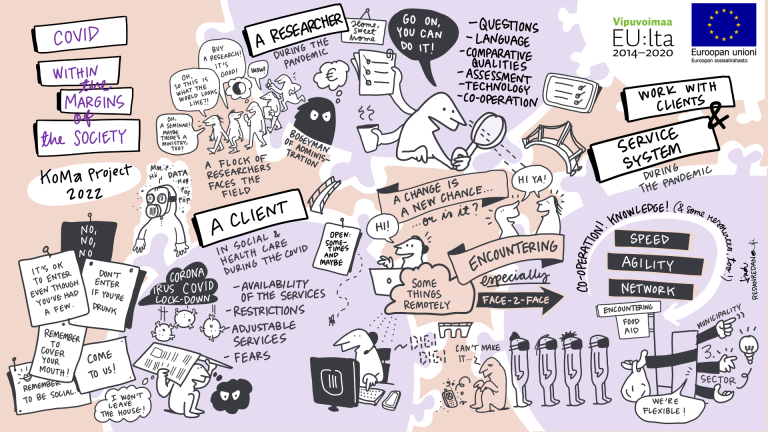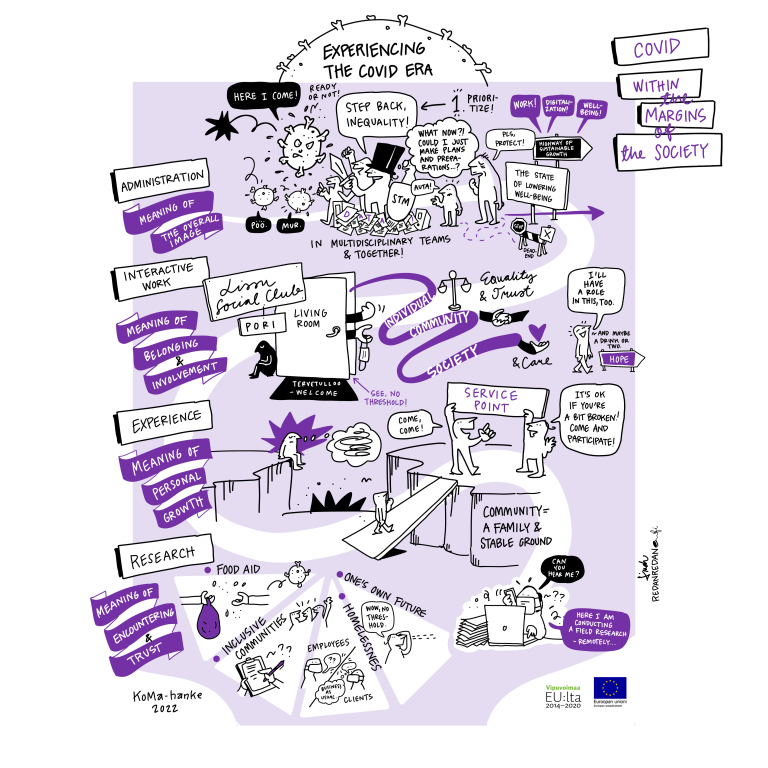The sub-project conducted at Tampere University focuses on homelessness. We are interested in the daily lives of people experiencing and at risk of homelessness and the employees working with them during and after the pandemic. People in need of support to find housing and to be able to live in housing are not one specific group, which is why we approach this research task from the perspective of the relational agency of the interacting parties. This perspective enables the examination of possibilities for action and intersectionality, ie the uneven and stratified intersections of power that affect people’s social position. We will explore the resilience of the people in the target group and the systems providing aid; how does resilience or resistance, functional capacity and adaptation to health threats emerge and change during the pandemic? As well as generating new knowledge, our task is to assess the recognition of the right to care and the equal treatment and inclusion of people experiencing or at risk of homelessness from the social justice perspective. KoMa is closely linked to the previous studies by the Margi research group.
The homelessness sub-project is conducted by Suvi Raitakari (principal investigator of the sub-project), Marja Hekkala, Henna Takala, Mikko Ilmoniemi, Jenni Mäki, Kirsi Juhila, Johanna Ranta and Leena Rusi.
At the University of Helsinki, the focus is on exploring what COVID-19 has meant for communities and the sense of community and inclusion in low-threshold service settings.
In the sub-project conducted by DIAK, the focus is on food aid in Finland and gathering information about the situation of food-insecure people. We are interested in the wellbeing and welfare service usage of people receiving charitable food aid, and the effects of the COVID-19 pandemic on them. We will explore the topic by conducting a survey on food aid recipients and another survey on food aid actors. The survey on food aid recipients is partly based on a previous research project conducted in the early 2010s. Our aim is to generate new scientific knowledge, and to develop the Finnish welfare service system to respond better to social problems. The food aid sub-project is conducted by Sakari Kainulainen (principal investigator of the sub-project) and Joakim Zitting.
The Sininauha Association of Pori is developing outreach work and setting up a new low-threshold service point while providing opportunities for data collection.
At the University of Helsinki, the focus is on exploring what COVID-19 has meant for the wellbeing and coping of people attending low-threshold meeting places (for example, meeting places for people with substance abuse or mental health problems). We are interested in the wellbeing and welfare service usage of people attending these places, and their coping during the COVID-19 pandemic. In addition, we focus on the role of the low threshold meeting places in their wellbeing and coping, and what COVID-19 has meant for the work of these meeting places. We will explore the topic by conducting a survey to attendees and a complementary survey to employees of different meeting places in different parts of Finland. The survey to attendees includes joint questions with the DIAK sub-project on food aid. Our aim is to generate new scientific knowledge, and to develop services to better respond to social problems. The low threshold meeting place -sub project is conducted by Henrietta Grönlund (principal investigator of the sub-project), Joni Hokkanen (researcher), and Jenna Järvinen (research assistant
The KoMa consortium is coordinated by Research Director Lauri Kokkinen together with Coordinator Henna Takala and the Project Director Laura Kalliomaa-Puha.




